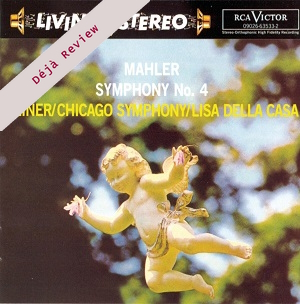
Déjà Review: this review was first published in May 2000 and the recording is still available.
Gustav Mahler (1860-1911)
Symphony No 4
Lisa Della Casa (soprano)
Chicago Symphony Orchestra/Fritz Reiner
RCA Victor 09026635332 [53]
This recording of Mahler’s Fourth dates from 1958 at which time RCA Victor had perfected their “Living Stereo” sound to coincide with what was a golden age at the Chicago Symphony with Fritz Reiner setting new standards of precision. This new release supersedes all previous versions by using the latest 20 bit technology to gain as much as possible from the original masters and the results are impressive. Comparing it with the previous CD issue there’s a clearly-marked gain in sharpness of detail, but it’s a pity it now appears at higher price and without a coupling. The previous cheaper issue boasted Strauss’s Burleske as a filler.
Mahlerians will know this performance well. Reiner exercises characteristically strict control over the Chicago Symphony and even more on the music. His emphasis is on clarity and there are certainly gains in that you are aware, to a remarkable degree, of the texture of the piece as you are too in the new Boulez recording which I also review this month. Unlike the Boulez recording, however, in the Reiner there’s a definite brittle quality to music that must have at least a patina of warmth, otherwise it can be wearing on repeated listening and this has always been my feeling with Reiner. But it certainly has a place in the recorded pantheon of Fourths. What’s really missing is a sense of repose so important in the passages of nostalgic reverie and fairy tale naivety Mahler beguiles us with. Reiner certainly brings out the grotesques, though. He can also turn the central climax in the first movement into one of transfiguring power. But there’s less context for the grotesques to breathe than we are used to with others. Less ability for us to reflect on what they mean because we have so little with which to compare them.
This is a very sharp ride, then. A cold journey through Mahler’s fairy tale landscapes, but one that should be experienced by those interested in how the symphony ticks as well as in hearing a great conductor and orchestra at the height of their powers with a much-loved soprano as guest. It should also interest those with ears for recorded sound since it illustrates what superb work was being done by the RCA Victor engineers over forty years ago. In fact, hearing this so soon after the new Boulez recording, I was prompted to wonder just how far the recording of music has moved since 1958.
Tony Duggan
Help us financially by purchasing from



















